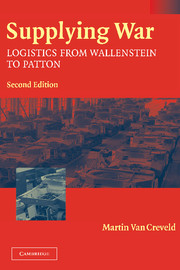Book contents
- Frontmatter
- Dedication
- Contents
- Maps
- Preface
- Introduction
- 1 The background of two centuries
- 2 'An army marches on its stomach!'
- 3 When demigods rode rails
- 4 The wheel that broke
- 5 Russian roulette
- 6 Sirte to Alamein
- 7 War of the accountants
- 8 Logistics in perspective
- Postscript: Where are we now?
- Note on sources
- Bibliography
- Notes
- Index
3 - When demigods rode rails
Published online by Cambridge University Press: 22 June 2023
- Frontmatter
- Dedication
- Contents
- Maps
- Preface
- Introduction
- 1 The background of two centuries
- 2 'An army marches on its stomach!'
- 3 When demigods rode rails
- 4 The wheel that broke
- 5 Russian roulette
- 6 Sirte to Alamein
- 7 War of the accountants
- 8 Logistics in perspective
- Postscript: Where are we now?
- Note on sources
- Bibliography
- Notes
- Index
Summary
Supply from Napoleon to Moltke
Scarcely had the guns of Waterloo fallen silent than soldiers everywhere began the process of studying and analysing Napoleon's campaigns with an eye to learning from them lessons for the future. Since the mobility of the French armies throughout the revolutionary period was legendary and universally recognized as a crucial factor in their success, the problem of logistics was subjected to a particularly searching examination, a process, indeed, which had started several years previously as commanders strove to imitate Napoleon's methods ad hoc. Thus, for example, the establishment of wagons, pack horses and baggage authorized to Austrian formations was drastically cut down as early as 1799-1800, and again after the defeats of 1805, with the result that, in the campaign of 1809, the Austrians were able to match the marching performances of the French for the first time. Again, on their way from Saxony to the Rhine in 1813, the allies showed that they had absorbed some of the lessons taught by the great Corsican.
Following this attempt to study and emulate Napoleonic logistics it did not take long for two opposed schools to appear. Of these, one is perhaps best represented by Andr6 de Roginat, a French officer who had taken part in the Emperor's wars and who published his reflections on them as early as 1816. In a chapter entitled ‘Des grandes operations de la guerre offensive en Europe', Roginat subjected Napoleon's administrative arrangements to a scathing criticism and reached the conclusion that his ultimate failure was due above all to the inadequate attention he paid to the lines of communication. In Roginat's view, strategic penetration deep into the enemy's country was all very well as long as it was carried out by small armies. Modern forces, however, were enormous in size and made demands in subsistence, ammunition and replacements on a scale that was more enormous still. Roginat further emphasized the difficulties that inevitably follow an army living off the country, including desertion, indiscipline, and trouble with the population. Calling the Austerlitz campaign ‘the height of madness', he accused Napoleon of allowing 300,000 men to starve to death in Russia and another 200,000 in Saxony. To remedy all these evils, Roginat suggested that the future lay in a ‘methodical', step by step, system of warfare.
- Type
- Chapter
- Information
- Supplying WarLogistics from Wallenstein to Patton, pp. 75 - 108Publisher: Cambridge University PressPrint publication year: 2004

